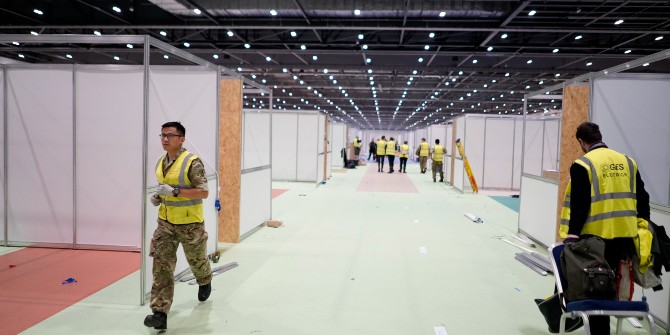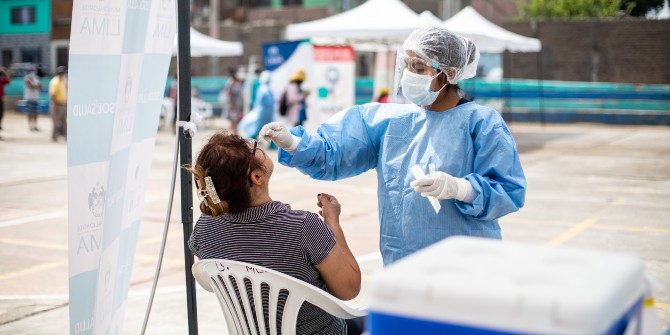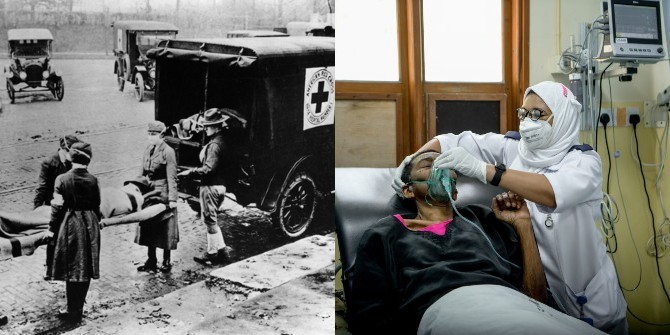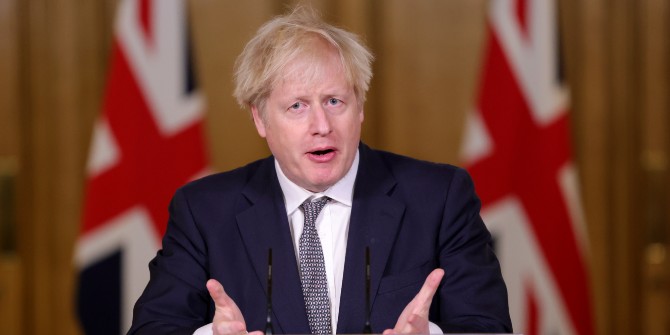The military has played a major role in the UK’s pandemic response, and there are signs the deployment has helped to make the forces more nimble and adaptable, says Carlos Solar (University of Essex).
At times of national crisis, governments often turn to the military. The pandemic is no exception. In the UK, the Ministry of Defence set up the COVID Support Force (CSF) in March 2020, using armed forces personnel to assist public services.
Since then, Britain’s military has been praised for showing rapid planning capacity, a problem-solving mentality, and an unquestionable chain of command. As of May 2021, the MOD had responded to 399 COVID-19 Military Aid to Civilian Authority (MACA) requests under three main areas of effort: helping NHS England to vaccinate people, supporting hospitals across the UK in intensive care units, and assisting with the national testing effort, setting up programmes in Birmingham, Nottingham, Merthyr Tydfil, Liverpool, Kent, Manchester and Scotland.
In Essex, for example, local MPs, health officials and the police commissioner requested military assistance after a peak of infection rates during the second wave of the virus threatened to overwhelm the NHS. Across the country, hundreds of veterans have also supported essential services to NHS Trusts and local authorities in Plymouth, Exeter, Stoke and Stafford.
Military Aid to Civilian Authorities requires ministerial approval. The legal authority to use the armed forces personnel in operations under MACA is governed by the Civil Contingencies Act 2004 and the Emergency Powers Act 1964. Very rarely do soldiers carry their weapons as this requires explicit authorisation, and they do not hold powers of arrest as law enforcement institutions do. MACA activity is not charged to the defence budget, meaning they can claim the costs involved for non-emergency, planned routine support.
Over the first six months of the pandemic, the CSF committed up to 4,000 armed forces personnel on most days. Up to 7,500 were in readiness to respond to future demands at home and overseas, including Gibraltar, the Falkland Islands and Ascension Island. The CSF’s roles and missions have been as varied as tackling online disinformation, supporting police services, planning logistical support, working with NATO partners, delivering personnel protective equipment (PPE), providing ambulance support and medical evacuation, and delivering testing kits to care homes.
A paper by Fawzia Gilbson-Fall argues that military engagements in health-related activities at the domestic level have changed global health military practices. As in Britain, military deployments using blended civil-military response are now a trend across industrialised and emerging nations in Africa, Asia and continental Europe, as shown in Table 1.
Table 1: Examples of military types of responses to COVID-19
| Trend type | Key characteristics | Example of response |
|---|---|---|
| Minimal technical military support | Civilian leadership-military niche tasks in transportation and supply chain, border control | Japan, Taiwan, Kerala, Sweden, New Zealand, South Korea |
| Blended civil-military response | Civilian leadership military support in organisation and logistics, air repatriations, border controls, mobile testing, quarantine and lockdown enforcement, emergency field hospitals | Nigeria, Kenya, US, France, UK, China, Vietnam, South Africa, Singapore |
| Military-led response | Military leadership in response planning and coordination, emergency hospitals, contact-tracing, surveillance, border controls, quarantine and lockdown enforcement | Indonesia, Philippines, Iran, Pakistan, Brazil, Peru |
Source: Fawzia Gibson-Fall (2021) Military responses to COVID-19, emerging trends in global civil-military engagements
Angela Merkel recently signed off the largest military contingent on the home front in Germany’s modern history to help alleviate increasing pressure on the health system. In France, Emmanuel Macron announced plans for 35 military-run vaccination centres around the country to boost mass immunisation.
Perhaps the most valuable, hands-on experience gained by the military has been through its surgeons and medical personnel embedded in the NHS during the pandemic. As a group of medical staff writing for the BMJ explained, “the military’s role within the NHS provided an opportunity to learn and capture lessons to take forward into its doctrine”. The forces might expect the pandemic to introduce new practices to military telemedicine, new technologies against new biological threats, and readiness for personal protective equipment (PPE) logistics, redeployment and training.

I argue in a recent article that introducing change in the MoD and the services is a rocky road. It demands reshaping organisational and managerial structures and is dependent on many internal and external pressures on the defence establishment. The fact that the government has eased bureaucracy and speeded up decision-making in light of the pandemic is a good indication that military policy can become more adaptable.
While most of the pressure has been on the home front, British top brass are equally concerned about preparing for future battles against foreign threats that could emerge after the danger to health is largely over. General Sir Nick Carter warned that a post-pandemic world could see political and financial nationalism rise to dangerous levels. Drawing parallels with the period following World War I and the post-1929 recession, Carter warned against some countries isolating and pushing against humanitarian norms and values worldwide.
The Nobel Peace Prize laureate, Mohamed ElBaradei, issued a similar call for states to reconvene their security to include new governance approaches beyond the physical that satisfy development goals on needs such as food, health, education, and employment. Like Carter, ElBaradei commended a global system steered by international cooperation.
It is still too early, however, to say what direct and indirect effects the pandemic will have on British defence policy and the broader Common Security and Defence Policy (CSDP) of the European Union. The pandemic redrew a strategic scenario characterised by austere military expenditure and focused primarily on tackling the most pressing traditional and unconventional security risks. As the world enters a new economic, political and security balance, the challenge for British policymakers remains the same: how to do more with what is already at hand.
This post represents the views of the author and not those of the COVID-19 blog, nor LSE.





